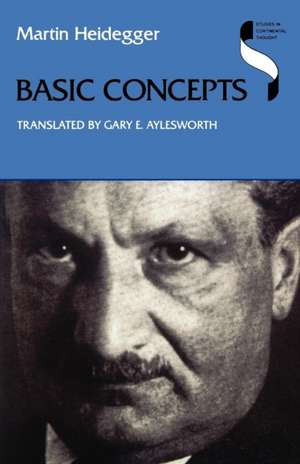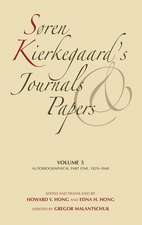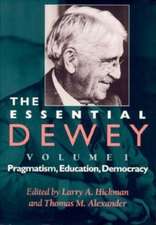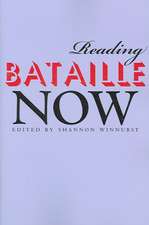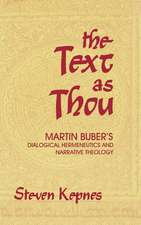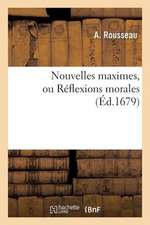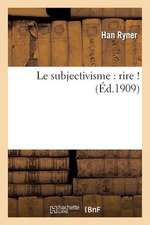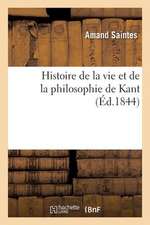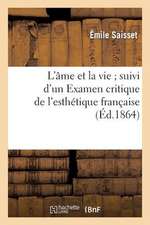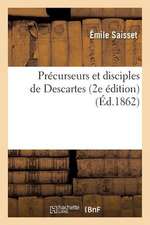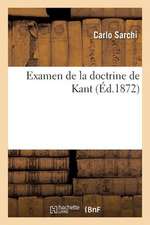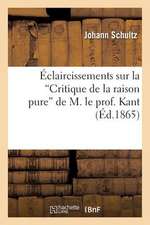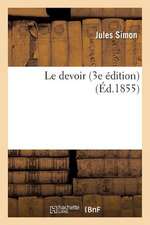Basic Concepts
Autor Martin Heideggeren Limba Engleză Paperback – 21 iul 1998
Preț: 125.20 lei
Nou
Puncte Express: 188
Preț estimativ în valută:
23.96€ • 24.54$ • 19.93£
23.96€ • 24.54$ • 19.93£
Carte tipărită la comandă
Livrare economică 18 martie-01 aprilie
Preluare comenzi: 021 569.72.76
Specificații
ISBN-13: 9780253212153
ISBN-10: 0253212154
Pagini: 128
Dimensiuni: 150 x 214 x 12 mm
Greutate: 0.18 kg
Editura: MH – Indiana University Press
ISBN-10: 0253212154
Pagini: 128
Dimensiuni: 150 x 214 x 12 mm
Greutate: 0.18 kg
Editura: MH – Indiana University Press
Recenzii
This translation is an excellent and accessible introduction to the later Heidegger. Published posthumously in 1981 as Grundbegriffe, this 1941 lecture series is an important marker in Heidegger's thinking and gives us access to his respelling out of the question of being and time. Here he sets forth eight guidewords that seem to be irresolvably contradictory assertions about being. The fact that being eludes modern reflection leads Heidegger to return to the beginnings of Western philosophical thought in search of the fateful decision about how being was to be thought--and by extension, how human being was to be defined. He asks, What if all previous answers to the questions of who we are were merely the repeated application of a [fatefully wrong] answer given long ago? While Heidegger spells out more fully his critique of humanist definitions of man in Letter on Humanism (1947), the present text shows us how his view there arises out of the quest for the meaning of being in the face of our modern forgetfulness of the ontological difference. In the second part of this work, Heidegger turns to two fragments from Anaximander, which, taken together in his interpretation, articulate at the very dawn of Western philosophy an initial saying of being and time together as timely emergence. Aylesworth's well--translated edition is essential for undergraduate libraries, recommended also for general readers, graduate students, faculty.--R. E. Palmer, MacMurray"Choice" (01/01/1994)
Notă biografică
Gary E. Aylesworth teaches philosophy at Eastern Illinois University.
Textul de pe ultima copertă
Basic Concepts, one of the first texts to appear in English from the critical later period of Martin Heidegger's thought, strikes out in new directions. First published in German in 1981 as Grundbegriffe (volume 51 of Martin Heidegger's collected works), it is the text of a lecture course that Heidegger gave at Freiburg in the winter semester of 1941 during the phase of his thinking known as the ""turning."" In this transition Heidegger shifted his attention from the problem of the meaning of being to the question of the truth of being. The text consists of an introduction and two parts. In the introduction Heidegger explains the meaning of his title as ""concepts of ground."" Part One, divided into three sections, attempts to thematize the difference between being and beings. The first section takes up the metaphysical, logical, grammatical, and everyday meanings of the verb ""to be"" and shows their inadequacy. The second section, a strikingly original discussion, examines a series of eight directives for reflecting on being. The third section shifts from being toward man and points to the discord between the two. In Part Two, Heidegger interprets two fragments by Anaximander to recover an ""incipient saying of Being"" that is poetic rather than metaphysical. In this clear translation by Gary E. Aylesworth, Basic Concepts provides a concise introduction to Heidegger's later thought.
Cuprins
Translator's Foreword
Introduction: The Internal Connection between Ground-Being-Inception
1. Elucidation of the title of the lecture "Basic Concepts"
Recapitulation
1. Our understnading of "basic concepts" and our relation to them as an anticipatory knowing
2. The decay of knowing in the present age: The decision in favor of the useful over what we can do without
3. The inception as a decision about what is essential in Western history (in modern times: unconditional will and technology)
4. Practicing the relation to what is "thought-worthy" by considering the ground
5. The essential admittance of historical man into the inception, into the "essence" of ground
Part One: Considering the Saying. The Differnce between Beings and Being
First Division: Discussion of the "Is", of Beings as a Whole
2. Beings as a whole are actual, possible, necessary
3. Nonconsideration of the essential distinction between being and beings
4. The nondiscoverability of the "is"
5. The unquestioned character of the "is" in its grammatical determination¿emptiness and richness of meaning
6. The solution of healthy common sense: Acting and effecting amoung beings instead of empty thinking about being (workers and soldiers)
7. Renouncing being¿dealing with beings
Recapitulation
1. Consideration of beings as whole presupposes the essential inclusion of man in the difference betwen being and beings
2. Wealth and poverty of meanin in the "is"
3. Equating dealing with the actual with considering begins as a whole
4. The unthought residence of man in the distinction between being and beings
Second Division: Guidewords for Reflection upon Being
8. Being is the emptiest and at the same time a surplus
9. Being is the most common and at the same time unique
10. Being is the most intelligible and at the same time concealment
11. Being is the most worn-out and at the smae time the origin
12. Being is the most reliable and at the same time the non-ground
13. Being is the most said and at the same time a keeping silent
14. Being is the most forgotten and at the same time remembrance
15. Being is the most constraining and at the same time liberation
16. Unifying reflection upon being in the sequence of quidewords
Recapitulation
Guidewords about Being
1. Being is empty as an abstract concept and at the same time a surplus
2. Being is the most common of all and at the same time uniqueness (The sameness of being and nothing)
3. The meaning of the quidewords: Instructions for reflection upon the difference between being and beings
Third Division: Being and Man
17. The ambivalence of being and the essence of man: What casts itself toward us and is cast away
18. The historicality of being and the historically esstential abode of man
19. Remembrance into the first inception of Western thinking is reflection upon being, is grasping the ground
Recapitulation
1. The discordant essence in the relation of man to being: The casting-toward and casting-away of being
2. Remembrance into the first inception is placement into still presencing being, is grasping it as the ground
Part Two: The Incipient Saying of Being in the Fragment of Anaximander
20. The conflicting intentions of philological tradition and philosophical translation
21. Nietzsche's and Diels's renderings of the fragment as the standard for interpretations current today
Recapitulation
The remembering return into the inception of Western thinking¿listening to the fragment of Anaximander
22. Reflection upon the incipient saying of being in the fragment of Anaximander
23. Excursus: Insight into the with the help of another word from Anaximander
24. The second sentence thinks being in correspondence with its essence as presencing, abiding, time
25. The relation of both sentences to one another: The fragment as the incipient saying of being
Editor's Epilogue
Glossary
Introduction: The Internal Connection between Ground-Being-Inception
1. Elucidation of the title of the lecture "Basic Concepts"
Recapitulation
1. Our understnading of "basic concepts" and our relation to them as an anticipatory knowing
2. The decay of knowing in the present age: The decision in favor of the useful over what we can do without
3. The inception as a decision about what is essential in Western history (in modern times: unconditional will and technology)
4. Practicing the relation to what is "thought-worthy" by considering the ground
5. The essential admittance of historical man into the inception, into the "essence" of ground
Part One: Considering the Saying. The Differnce between Beings and Being
First Division: Discussion of the "Is", of Beings as a Whole
2. Beings as a whole are actual, possible, necessary
3. Nonconsideration of the essential distinction between being and beings
4. The nondiscoverability of the "is"
5. The unquestioned character of the "is" in its grammatical determination¿emptiness and richness of meaning
6. The solution of healthy common sense: Acting and effecting amoung beings instead of empty thinking about being (workers and soldiers)
7. Renouncing being¿dealing with beings
Recapitulation
1. Consideration of beings as whole presupposes the essential inclusion of man in the difference betwen being and beings
2. Wealth and poverty of meanin in the "is"
3. Equating dealing with the actual with considering begins as a whole
4. The unthought residence of man in the distinction between being and beings
Second Division: Guidewords for Reflection upon Being
8. Being is the emptiest and at the same time a surplus
9. Being is the most common and at the same time unique
10. Being is the most intelligible and at the same time concealment
11. Being is the most worn-out and at the smae time the origin
12. Being is the most reliable and at the same time the non-ground
13. Being is the most said and at the same time a keeping silent
14. Being is the most forgotten and at the same time remembrance
15. Being is the most constraining and at the same time liberation
16. Unifying reflection upon being in the sequence of quidewords
Recapitulation
Guidewords about Being
1. Being is empty as an abstract concept and at the same time a surplus
2. Being is the most common of all and at the same time uniqueness (The sameness of being and nothing)
3. The meaning of the quidewords: Instructions for reflection upon the difference between being and beings
Third Division: Being and Man
17. The ambivalence of being and the essence of man: What casts itself toward us and is cast away
18. The historicality of being and the historically esstential abode of man
19. Remembrance into the first inception of Western thinking is reflection upon being, is grasping the ground
Recapitulation
1. The discordant essence in the relation of man to being: The casting-toward and casting-away of being
2. Remembrance into the first inception is placement into still presencing being, is grasping it as the ground
Part Two: The Incipient Saying of Being in the Fragment of Anaximander
20. The conflicting intentions of philological tradition and philosophical translation
21. Nietzsche's and Diels's renderings of the fragment as the standard for interpretations current today
Recapitulation
The remembering return into the inception of Western thinking¿listening to the fragment of Anaximander
22. Reflection upon the incipient saying of being in the fragment of Anaximander
23. Excursus: Insight into the with the help of another word from Anaximander
24. The second sentence thinks being in correspondence with its essence as presencing, abiding, time
25. The relation of both sentences to one another: The fragment as the incipient saying of being
Editor's Epilogue
Glossary
